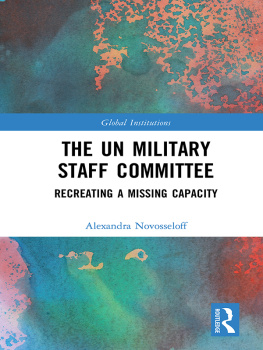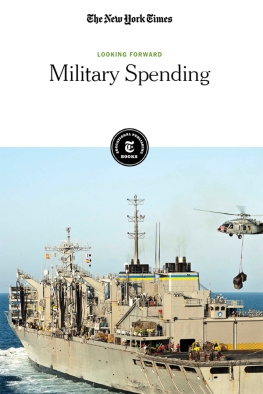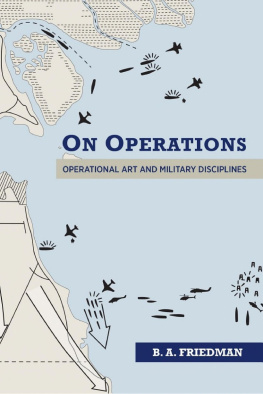The UN Military Staff Committee
The UN Military Staff Committee is a misunderstood organ, and never really worked as it was initially envisaged. This book charts its historic development as a means to explain the continuous debate about the reactivation of the Military Staff Committee and, more generally, the unsatisfied need for the Security Council to have a military advisory body so that it does not only depend on the Secretariat to make its decisions on military and security affairs.
The author takes a clear stand for the establishment of a military committee with real weight in the decision-making process of the Security Council related to peace operations. The Security Council remains the only international body making decisions in peace and security, authorizing military deployment without advice from a collective body of military experts and advisers. Recreating such a body is the missing part of all UN reform structures undertaken in past years.
As the number of UN troops deployed increases, this book will be an important read for all students and scholars of international organisations, security studies and international relations.
Alexandra Novosseloff is a Senior Visiting Fellow at the International Peace Institute in New York. She is also a research associate at the Centre Thucydide of the University Paris 2-Panthon-Assas where she held her PhD in Political Science and International Relations. She has written a number of books, policy reports and articles on the UN Security Council and on UN peacekeeping.
Global Institutions
Edited by Thomas G. Weiss
The CUNY Graduate Center, New York, USA
and Rorden Wilkinson
University of Sussex, Brighton, UK
About the series
The Global Institutions Series provides cutting-edge books about many aspects of what we know as global governance. It emerges fromour shared frustrations with the state of available knowledgeelectronic and print-wise, for research and teachingin the area.The series is designed as a resource for those interested in exploring issues of international organization and global governance. And since the first volumes appeared in 2005, we have taken significant strides toward filling conceptual gaps.
The series consists of three related streams distinguished by their blue, red, and green covers. The blue volumes, comprising the majority of the books in the series, provide user-friendly and short (usually no more than 50,000 words) but authoritative guides to major global and regional organizations, as well as key issues in the global governance of security, the environment, human rights, poverty, and humanitarian action among others. The books with red covers are designed to present original research and serve as extended and more specialized treatments of issues pertinent for advancing understanding about global governance. And the volumes with green coversthe most recent departure in the seriesare comprehensive and accessible accounts of the major theoretical approaches to global governance and international organization.
The books in each of the streams are written by experts in the field, ranging from the most senior and respected authors to first-rate scholars at the beginning of their careers. In combination, the three components of the seriesblue, red, and greenserve as key resources for faculty, students, and practitioners alike. The works in the blue and green streams have value as core and complementary readings in courses on, among other things, international organization, global governance, international law, international relations, and international political economy; the red volumes allow further reflection and investigation in these and related areas.
The books in the series also provide a segue to the foundation volume that offers the most comprehensive textbook treatment available dealing with all the major issues, approaches, institutions, and actors in contemporary global governanceour edited work International Organization and Global Governance (2014)a volume to which many of the authors in the series have contributed essays.
Understanding global governancepast, present, and futureis far from a finished journey. The books in this series nonetheless represent significant steps toward a better way of conceiving contemporary problems and issues as well as, hopefully, doing something to improve world order. We value the feedback from our readers and their role in helping shape the on-going development of the series.
A complete list of titles can be viewed online here: https://www.routledge.com/Global-Institutions/book-series/GI.
Sovereign Rules and the Politics of International Economic Law (2018)
by Marc D. Froese
The Use of Force in UN Peacekeeping (2018)
edited by Peter Nadin
Human Rights and Conflict Resolution (2018)
edited by Claudia Fuentes Julio and Paula Drumond
Global Trends and Transitions in Security Expertise (2018)
by James G. McGann
UNHCR as a Surrogate State (2018)
by Sarah Deardorff Miller
The British Media and the Rwandan Genocide (2018)
by John Nathaniel Clarke
The League of Nations (2018)
by M. Patrick Cottrell
Global Governance and China (2018)
edited by Scott Kennedy
First published 2018
by Routledge
2 Park Square, Milton Park, Abingdon, Oxon OX14 4RN
and by Routledge
711 Third Avenue, New York, NY 10017
Routledge is an imprint of the Taylor & Francis Group, an informa business
2018 Alexandra Novosseloff
The right of Alexandra Novosseloff to be identified as author of this work has been asserted by her in accordance with sections 77 and 78 of the Copyright, Designs and Patents Act 1988.
All rights reserved. No part of this book may be reprinted or reproduced or utilised in any form or by any electronic, mechanical, or other means, now known or hereafter invented, including photocopying and recording, or in any information storage or retrieval system, without permission in writing from the publishers.
Trademark notice: Product or corporate names may be trademarks or registered trademarks, and are used only for identification and explanation without intent to infringe.
British Library Cataloguing in Publication Data
A catalogue record for this book is available from the British Library
Library of Congress Cataloging in Publication Data
A catalog record for this book has been requested
ISBN: 9781138042209 (hbk)
ISBN: 9781315173863 (ebk)











